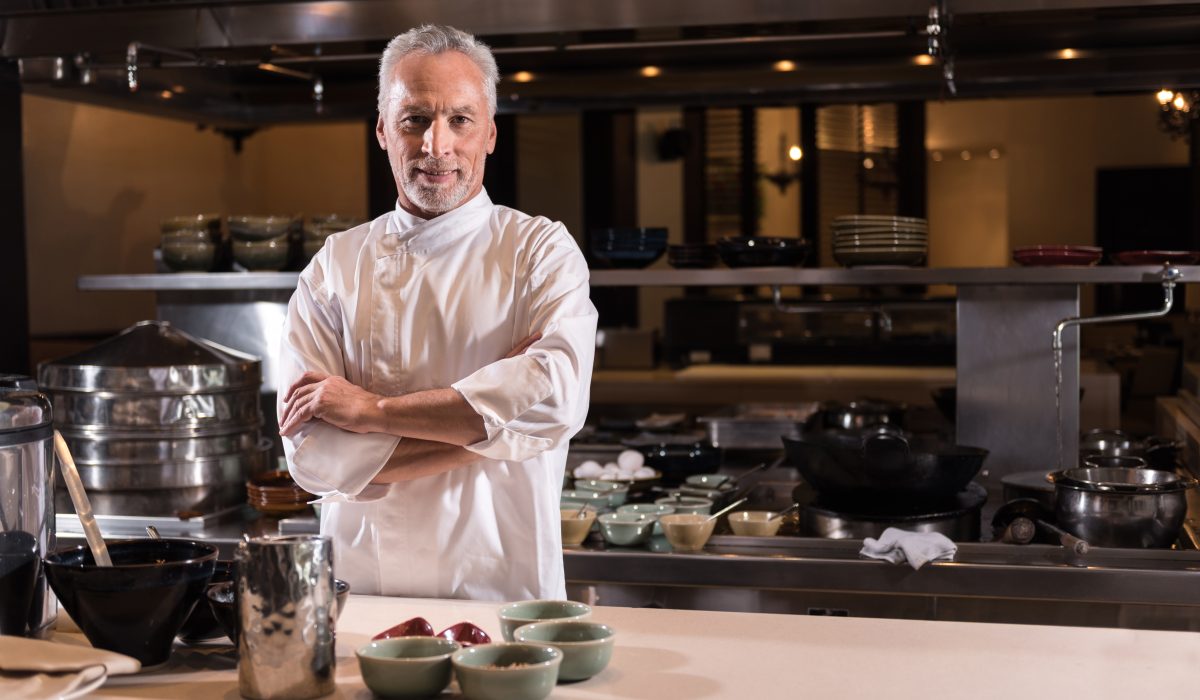Executive Chef Jobs
Looking for executive chef jobs? This article from the team at Pineapple Recruitment will guide you through the key responsibilities, top locations, required skills and tips on how to get the job in the UK. Whether you’re an experienced chef looking for a leadership role or your next big opportunity, we’ve got you covered.
- Executive head chefs oversee kitchen operations, manage staff and quality standards and also plan menus and source ingredients.
- Top locations for executive chef jobs in the UK are London, the South East and Edinburgh, with emerging markets in Manchester and Bristol.
- Successful executive chefs possess a combination of technical skills, leadership skills, and creativity, which is key to advancing in their culinary careers.
What Does an Executive Chef Do?
An Executive Chef is the key person in any kitchen. In some establishments, this senior role is referred to as the Executive Head Chef, underscoring its importance and responsibility for overseeing the overall kitchen direction. It’s important to note that while the terms ‘Executive Chef’ and ‘Head Chef’ are often used interchangeably, there can be subtle differences in their roles and responsibilities depending on the establishment.
 They are responsible for running the kitchen, ensuring all dishes meet quality standards, and maintaining a safe kitchen environment by adhering to health and safety regulations. This role requires a combination of culinary and management skills to ensure the kitchen operates smoothly.
They are responsible for running the kitchen, ensuring all dishes meet quality standards, and maintaining a safe kitchen environment by adhering to health and safety regulations. This role requires a combination of culinary and management skills to ensure the kitchen operates smoothly.
Head chef jobs are essential to maintaining high standards in the kitchen. Daily operation management is a big part of the Executive Chef’s job. This includes maintaining kitchen equipment, scheduling shifts and managing staff hours and weekly rotas to ensure the kitchen runs efficiently. The Executive Chef is also responsible for delivering and implementing new culinary concepts, recipes, and standards in the kitchen, ensuring that innovations are executed in service. Overseeing these areas enables the executive chef to maintain kitchen efficiency even during peak periods.
In addition to these operational tasks, an Executive Chef also manages and trains kitchen staff. This means creating an environment where chefs can thrive and develop. Mentoring a sous chef and other staff members helps maintain high standards of culinary output and team cohesion.
Menu planning is another key responsibility of an Executive Chef. They must align dishes with the restaurant’s concept and source ingredients to the required quality. Updating the menu seasonally and according to customer preferences keeps the dining experience fresh and exciting. In essence, an Executive Chef is the backbone of the kitchen, ensuring excellence in every aspect of kitchen operations.
 Supporting roles in the kitchen are built on teamwork; every chef plays a part in delivering great food and memorable dining experiences. While the Executive Chef and Head Chef lead the way, supporting roles such as Sous Chef, Chef de Partie and other chefs are essential to any restaurant or hospitality venue.
Supporting roles in the kitchen are built on teamwork; every chef plays a part in delivering great food and memorable dining experiences. While the Executive Chef and Head Chef lead the way, supporting roles such as Sous Chef, Chef de Partie and other chefs are essential to any restaurant or hospitality venue.
The Sous Chef is the right hand to the Head Chef, taking on a significant amount of responsibility for food preparation, menu development, and day-to-day kitchen management. Whether in a fine dining restaurant or a busy hotel kitchen, sous chefs often lead sections, train junior chefs, and ensure every dish meets the high standards expected by customers. Their ability to manage teams, maintain quality and support the Head Chef is key to success.
Chef de Parties, or Station Chefs, are responsible for specific areas of the kitchen, such as the grill, pastry, or sauce section. These chefs possess specialist skills and attention to detail. Working alongside other chefs, they help create a seamless operation, perfecting every dish.
Other supporting roles, such as Junior Chefs and Kitchen Assistants, provide essential support by performing food preparation, maintaining kitchen cleanliness, and assisting with basic cooking tasks. These roles offer hands-on experience and are often the first step in a culinary career.
For those passionate about food and seeking to develop their skills, supporting roles in the kitchen provide a clear career path. Many Head Chefs and Executive Chefs in the UK began their careers as sous chefs or chef de parties, learning the intricacies of kitchen management, menu development, and team leadership along the way.
With dedication, creativity and a commitment to quality, chefs in these roles can thrive and move up the career ladder.
Top Locations for Executive Chef Jobs in the UK
When looking for a career as an Executive Chef in the UK, you will become part of a vibrant culinary scene that offers diverse opportunities. London, in particular, is a hub for executive chef jobs, with its varied culinary environments and high-profile establishments that attract top talent from around the world. Being part of this scene is a source of pride for many Executive Chefs.
Outside of London, the South East of England is known for its luxury hotels and fine dining establishments, making it a popular destination. Edinburgh also shines as a culinary destination, boasting a vibrant food scene that attracts top executive chefs seeking to make their mark.
Emerging markets are gaining popularity among Executive Chefs:
- Manchester
- Bristol
- Chester
- Poole
These emerging markets are not just gaining popularity; they are also a source of anticipation and excitement for Executive Chefs. With the growth in restaurants and hotels, these regions offer new opportunities for chefs to advance in the hospitality industry.
Whether you want the buzz of a city or the charm of a smaller town, the UK has locations to start your Executive Chef career.
Skills for Executive Chef Roles
To be an Executive Chef, you need:
- Technical skills, including food prep skills, technical cooking techniques and knowledge of ingredients
- Leadership skills
- Creativity
An Executive Chef must also have a deep understanding of flavours and ingredients to create balanced and complex dishes that delight customers. Leadership skills are crucial for managing kitchen teams and maintaining smooth operations in high-pressure environments. Effective communication enables executive chefs to coordinate with kitchen staff and ensure timely food service. Executive chefs must also be able to perform under pressure, juggling multiple tasks while maintaining high standards of service.
Creativity and business acumen are also crucial for Executive Chefs. Designing menus and dishes that attract customers requires a high level of creativity and culinary expertise. Understanding the business side of running a kitchen, including restaurant finances and operations, is equally essential for long-term success.
With the industry expected to experience significant job growth, opportunities for executive chefs are on the rise. The demand for skilled chefs is on the rise. This growth presents a promising outlook for those considering a career as an Executive Chef in the UK.
Benefits of Being an Executive Chef
 One of the most significant benefits of being an executive chef is the creative freedom it affords. Executive Chefs have the freedom to experiment with recipes and cooking techniques, to express themselves and bring new dining experiences to life. This creative freedom is a big draw for many chefs looking to make their mark in the industry.
One of the most significant benefits of being an executive chef is the creative freedom it affords. Executive Chefs have the freedom to experiment with recipes and cooking techniques, to express themselves and bring new dining experiences to life. This creative freedom is a big draw for many chefs looking to make their mark in the industry.
In addition to creative freedom, Executive Chefs often have a routine. While the role can be demanding, the set tasks and structured daily workflow provide a sense of stability. Most Executive Chef roles are full-time and permanent, with job security and a consistent schedule. This discipline and dedication help chefs advance their careers to become executive chefs.
Another benefit is the perks that come with the job:
- Many establishments offer discounted or free meals, which means lower food costs
- The opportunity to lead a kitchen
- The chance to create memorable dining experiences
Some companies in the hospitality industry also offer additional benefits to their executive chefs, such as health insurance and professional development opportunities.
These benefits make being an Executive Chef a rewarding role.
How to Find Executive Chef Jobs
Finding executive chef jobs requires:
- Networking in the industry.
- Attending culinary events and associations to access unadvertised roles and boost career prospects.
- Building relationships with other chefs and industry professionals to find new opportunities.
Online job boards are a valuable resource for finding Executive Chef roles. These platforms allow you to search a wide range of job listings and alerts and apply directly to roles that match your skills and experience. When applying, make a note of the job ID or application number for each role so you can track your applications and future correspondence. Using these platforms will increase your chances of finding the right job.
Pineapple Recruitment plays a significant role in helping chefs find the ideal job. We provide career guidance, CV preparation, and professional coaching to candidates to help them stand out in the competitive culinary job market. By utilising these resources, aspiring executive chefs can recruit more effectively and secure the job they desire.
Note: Always check work eligibility requirements and provide necessary documentation during the application process.
Preparing for an Executive Chef Interview
Preparing for an Executive Chef interview requires research and practice. Start by researching the restaurant or organisation to understand their mission, cuisine style and customer base, helping you tailor your answers to their values and goals.
Familiarise yourself with the role requirements, menu planning, kitchen management and food safety standards. Practice common interview questions on culinary techniques and management challenges to prepare well. This will boost your confidence and make you come across as a knowledgeable and capable candidate.
In the interview, you should:
- Show your passion for cooking and ability to lead a team.
- Highlight your previous experience and achievements.
- Explain how you contributed to the success of your prior employment.
By showing your enthusiasm and leadership skills, you will leave a lasting impression on potential employers as they expect.
Career Progression for Executive Chefs
The career progression for Executive Chefs is vast and varied. One route is to move into senior management roles, such as food and beverage directors in larger operations. These roles offer increased responsibility and the opportunity to shape the overall culinary strategy of the business.
Another option for experienced Executive Chefs is to open their own restaurants or culinary businesses. This entrepreneurial path enables chefs to bring their unique vision to life and establish a brand centred on their culinary expertise. Alternatively, some Executive Chefs transition into consulting roles, offering their culinary expertise to businesses seeking to enhance their food offerings.
Pursuing opportunities in culinary education is another great option. Training and mentoring the next generation enables Executive Chefs to share their knowledge and experience, shaping the future of the culinary industry.
There are numerous career advancement opportunities, allowing Executive Chefs to continue growing and evolving.
Success Stories: Executive Chefs Who Made It Big
Success stories of Executive Chefs can be highly inspiring for those seeking to advance in their culinary careers. Take Julia Child, for example, who made French cooking accessible to American home cooks through her influential cookbooks and television shows. Her journey from a novice cook to a culinary icon shows the scope for growth and innovation in the culinary world.
Stories like this illustrate the profound impact that Executive Chefs can have on the culinary world. By being creative, dedicated and passionate about cooking, chefs can achieve great success and leave a lasting legacy. Whether through opening a successful restaurant, writing a best-selling cookbook or becoming a television personality, the options are endless for those who want to make their mark.
Aspiring Executive Chefs can draw inspiration from these success stories and create their own path to greatness. By staying committed to their craft, learning and seizing opportunities, they can achieve their culinary dreams and inspire others along the way, driven by their ambition.
In summary, becoming an Executive Chef is a rewarding and exciting career choice that offers numerous opportunities for growth and creativity. From managing kitchen staff and planning menus to leading culinary innovation, executive chefs play a key part in the success of any restaurant. The UK has many locations where aspiring chefs can find exciting job opportunities and build their careers.
Whether just starting or looking to advance, understanding the skills required, the benefits of the role, and how to prepare for interviews will put you on the right track. With dedication and passion, you can achieve your culinary dreams and make a lasting impact in the industry.
FAQs
What are the primary responsibilities of an Executive Chef?
The primary responsibilities include managing kitchen workflow, staff, quality standards for dishes, equipment, scheduling, and menu planning. These tasks are crucial to the smooth operation of the kitchen and the overall success of the restaurant.
Where are the top locations for Executive Chef jobs in the UK?
London, South East England, Edinburgh, Manchester, Bristol, Chester, and Poole are the top locations for executive chef jobs in the UK, each offering its unique culinary opportunities.
What skills are required to be an Executive Chef?
An Executive Chef needs to possess strong food preparation skills, leadership abilities, practical communication skills, creativity, and business acumen to be successful in their role. Developing these skills will improve kitchen management and the overall dining experience.
How do I find Executive Chef jobs?
Find jobs by networking in the industry, using online job boards and considering recruitment services like Pineapple Recruitment. This multifaceted approach will increase your chances of securing a job.
What are the career progression opportunities for Executive Chefs?
Executive Chefs can advance their careers by transitioning into senior management, opening restaurants, consulting, or pursuing further culinary education. By taking these opportunities, they can have a varied and fulfilling career.





